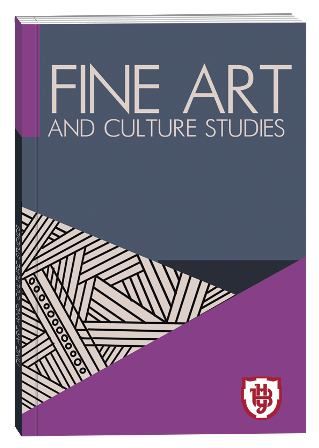THEORETICAL APPROACHES TO STUDYING THE INFLUENCE OF MUSIC ON PERSONALITY
DOI:
https://doi.org/10.32782/facs-2025-3-1-33Keywords:
music, personality, psycho-emotional state, value orientations, socialization, psychological approachesAbstract
The article presents an in-depth analysis of the main theoretical approaches to the study of the influence of music onpersonality. The psychodynamic, cognitive, behavioral, humanistic, socio-cultural and neuropsychological approaches areconsidered, which allow to comprehensively understand the mechanisms of influence of musical art on a person. The resultsof modern foreign and domestic studies highlighting the relationship between music and the psycho-emotional state, the formation of value orientations, personal identity, and socialization processes are summarized. The psychodynamicapproach focuses on the ability of music to reflect unconscious experiences and internal conflicts, while the cognitiveapproach emphasizes its role in modifying the processes of perception, thinking, and comprehension of emotions.The behavioral approach interprets music as a stimulus for the formation of behavioral reactions, while the humanistic approach emphasizes the importance of music in the process of self-knowledge, self-expression and achievement of inner harmony. The socio-cultural approach highlights music as a means of shaping social norms, identities, and groupmembership, which influences mass consciousness and interpersonal interaction. The neuropsychological approachdemonstrates how music activates nervous and neurochemical processes, promoting positive emotional reactions,improving cognitive functioning and emotional stability. Promising areas for further research are identified, in particular,the study of the role of music in overcoming stressful conditions, building resilience, preventing deviant behaviors, developing creative potential and harmonizing interpersonal relationships. The results of the analysis can be used in the practice of psychological counseling, psychotherapy, educational and socio-cultural activities. The need to integrate knowledge of music psychology into the system of psychoprophylactic and correctional work is emphasized.
References
Гаврилюк І. М. Нейропсихологічні основи психічного розвитку дитини : навч. посіб. К. : Центр учбової літератури, 2019. 280 с.
Гнатюк Ю. О. Психокорекційний потенціал музики у роботі з тривожними станами. Психологічний часопис. 2019. Випуск (1). С. 89–95.
Деркач С. О. Особистісний розвиток у професійній діяльності : навч. посіб. К. : КНТ, 2019. 368 с.
Караванова О. М. Соціокультурні чинники формування особистості : навч. посіб. К. : Центр учбової літератури, 2020. 312 с.
Копилова О., Булах І. Когнітивні стратегії в інтерпретації емоційних переживань під впливом музики. Психологія мистецтва. 2017. Випуск 3 (15). С. 45–53.
Кузнєцова О. В. Соціальна психологія музичного середовища. К. : Інтерсервіс, 2017. 244 с.
Моляко В. О. Нейропсихологія : навч. посіб. К. : Каравела, 2018. 432 с.
Огороднік О. В. Корекційно-розвивальна робота з підлітками, схильними до девіантної поведінки : навч.- метод. посіб. К. : НПУ ім. М. П. Драгоманова, 2020. 210 с.
Орбан-Лембрик Л. Е. Психологія особистості : навч. посіб. К. : Академвидав, 2018. 384 с.
Осика О. Клієнт-центрована терапія К. Роджерса у психокорекційній роботі зі студентами. Проблеми сучасної психології. 2019. Випуск (28). DOI: https://doi.org/10.32626/2227-6246.2015-28.%p
Панок В. Г. Психологія розвитку особистості : навч. посіб. К. : Центр учбової літератури, 2019. 368 с.
Панько Н. Вплив музики на емоційний стан підлітків. Психологія і суспільство. 2020. Випуск (3). С. 134–141.
Титаренко Т. М. Життєвий світ особистості: в теорії і практиці психологічного консультування. К. : Ін-т психології ім. Г. С. Костюка НАПН України, 2019. 380 с.
Фільц А. Г. Музикотерапія: психотерапевтичний потенціал музики. Л. : ЛНМУ ім. Данила Галицького, 2017. 340 с.
Фройд З. Вступ до психоаналізу. Нові висновки / перекл. П. Таращук. К. : Навчальна книга – Богдан, 2021. 555 с.
Чепелєва Н. В. Психологія культури : навч. посіб. К. : КНТ, 2021. 328 с.
Юнг К. Г. Архетип і символ / пер. В. Нємец. Київ : Центр учбової літератури, 2024. 340 с.
Juslin P. N., Sloboda J. A. (Eds.). Handbook of Music and Emotion: Theory, Research, Applications. Oxford University Press, 2010.
Koelsch S. Brain correlates of music-evoked emotions. Nature Reviews Neuroscience, 15 (3), 2014. P. 170–180. DOI: https://doi.org/10.1038/nrn3666
Liu Y., Liu X. and Zheng M. (2023) A correlation study of music training, adult attachment, and personality traits using a large-sample questionnaire. Front. Psychol. 14:1218848. DOI: https://doi.org/10.3389/fpsyg.2023.1218848
Mariusz Kleć, Alicja Wieczorkowska, Krzysztof Szklanny & Włodzimierz Strus (2023) Beyond the Big Five personality traits for music recommendation systems. EURASIP Journal on Audio, Speech, and Music Processing volume 2023, Article number: 4 (2023) pioneerpublisher.com+15asmp-eurasipjournals.springeropen.com+15suspilne. media+15en.wikipedia.org
Schirmer, A. Music and social cognition: The role of emotional and cognitive mechanisms. Frontiers in Psychology, 10, 2019. Article 1248. DOI: https://doi.org/10.3389/fpsyg.2019.01248
Skinner, B. F. (1957). Verbal Behavior. New York: Appleton-Century-Crofts.
Thoma M. V., Ryf S., Mohiyeddini C., Ehlert U., Nater U. M. Emotion regulation through listening to music in everyday situations. Cognition and Emotion. 2012. Vol. 26, No. 3. P. 550–560.
Watson, J. B. (1924). Behaviorism. New York : W. W. Norton & Company.








